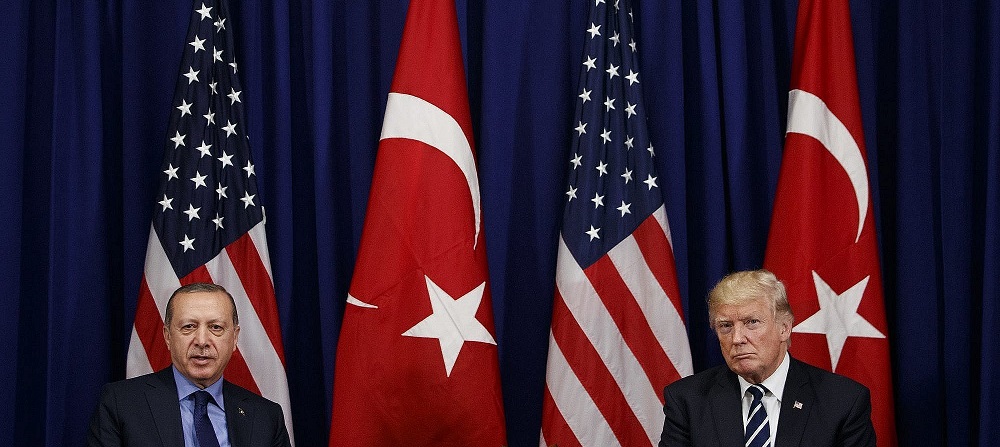Alwaght- The Turkish-American rift was sparked by a tweet. On, July 26, the US President Donald Trump in a Twitter post called on Ankara to release American pastor Andrew Brunson who was charged by a Turkish court with links to the US-based opposition cleric, Fethullah Gulen, and the terrorist group PKK.
Turkey refrained from releasing the pastor. In response, Washington immediately imposed sanctions on the Turkish Interior Minister Suleyman Soylu and Justice Minister Abdulhamit Gul over their role in American national’s detention.
The reactions ushered in a domino-style row between the two allies. Trump in a post on 10 August said he was doubling the tariffs on Turkish steel and aluminum imports to the US. He also warned that a new batch of sanctions was to follow. The Turkish administration hit back by similar tariffs on the American products.
The tensions caused a currency crisis in Turkey. Only a day after Trump’s tweet, the Turkish currency lira value fell. Each dollar was dealt for 6.91 liras, meaning an 84.2 percent loss of value by the Turkish currency. Earlier this year, each dollar was sold for 3.75 liras.
The currency crisis and economic pressures made Ankara lash out at Washington, accusing it of “stabbing in the back”, and warning that their alliance is ending. President Recep Tayyip Erdogan of Turkey in an article published by the New York Times on August 11 warned of the end of alliance with the US and said Turkey finds new friends and allies. The warning is not easy to ignore.
Erdogan was right about his warning. The couple’s alliance is closer than ever to collapse. But is Trump the cause or it has deeper roots?
Turkish-American differences surely transcend Trump era and stem from 28 years of accumulated disputes since the end of the Cold War. The following are 17 factors that exhibit the end of the alliance:
1. During the First Persian Gulf War, in 1991, Turkey withheld its territory from the US for anti-Iraqi operations. It also declined to join the US-led alliance against Iraq’s Saddam Hussain.
2. In the Balkans war, Turkey moved against NATO strategy by offering help to the Islamic groups. The support was highly noticeable during the rule of Necmettin Erbakan-led Welfare Party.
3. In 2003, Turkey turned down a US request to use its Incirlik airbase for bombing Iraq.
4. When in 2004, the then-US President George W. Bush exposed to CNN his administration’s Greater Middle East program, Erdogan, dreaming of restoring Ottoman Empire, came against the idea, saying Washington’s plan was dangerous to the region.
5. In 2005, The US-based International Center for Terrorism Studies published a report in which it gave proofs about Turkey’s support to Islamists who attacked the US forces in the region. The report triggered White House’s anti-Turkish fury.
6. Since 2011, the year the Arab uprisings erupted, Turkey, assisted by Qatar, pushed for Muslim Brotherhood’s rise to power in Egypt, Tunisia, Libya, and Morocco, moving contrary to Washington’s regional policies.
7. Since the outset of the Syrian crisis, Ankara leaders pressed for a safe zone starting from Azaz to Jarabulus in Aleppo province. The idea, however, was brazenly rejected by the US.
8. Turkey and the US have been at loggerheads over Washington’s alliance with Syrian Kurds starting from 2014. Erdogan accuses the Americans of backing Syrian branch of Kurdistan Workers’ Party (PKK), Turkey’s archenemy.
9. In late 2016, Turkey in a shift of policy turned to Russia-Iran alliance in Syria. With Russia, it brokered first Syrian ceasefire on December 31 the same year. Turkey also joined Astana peace process on Syria beside Iran and Russia, arousing the ire of the Americans.
10. A failed military coup hit Turkey in July 2016. Ankara said it has documents showing US intervention. The incident was the main cause of Erdogan’s pessimism toward Washington.
11. Turkey’s expansion of trade ties with Iran. Since 2017, the two neighbors’ trade increased by 14 percent, touching $8 billion. The issue caused severe American discontentment.
12. After the military coup, Ankara engaged in mounting military and political ties with Russia. Turkey’s order of Russian-made S-400 air defense systems drew strong White House reactions, including F-35 fighter jets delivery suspension
13. The US is discomforted to see Turkey bolstering ties with China which is bracing for massive investment in the Turkish projects.
14. Erdogan attacked the US for moving its embassy from Tel Aviv to al-Quds (Jerusalem). Ankara’s support for the Palestinian groups fueled to deepening division of the allies.
15. Turkey also criticized the Trump administration for withdrawing from the Iran nuclear deal, reached in 2015 between Tehran and the world powers– the US, China, Russia, France, Germany, Britain. As the US re-imposed sanctions on Tehran, Ankara said it is not committed to them, adding fuel to the already-burning fire.
16. Turkey is riled to see the White House still militarily supporting the Syrian Kurds even after ISIS terrorist organization was declared defeated.
17. And very recent gaps are caused by verbal clashes between the two countries’ officials.
Now it is clear that US-Turkey relations are really approaching their end. The track record makes it crystal clear that their disputes did not come with Trump. They are an accumulation of years-long conflict of policies now ignited.
But in the world of politics, nothing is certain. De-escalation of tensions can happen at any time. What needs to be taken into account is that their accumulated disputes cannot be disregarded. AKP and Erdogan’s Turkey hold fundamental differences with US policy. Firstly, the ruling AKP is an Islamic party with an Islamic mindset. Secondly, it managed to largely cement its power using a crackdown on the opposition. The clout offers Erdogan and his team the strength to independently counter Washington’s demands, breaking with a Turkey obedient, allied, and submissive to the US.



























